Analysis of Dark Horse’s "Eliminating Three Harms Around": Concise and Multi-faceted

Wen | Zero One
After entering March, the first new films are argyle: Secret Agent and Mrs Spider: Super Sensual Awakening. These two "cannon fodder-like" imported films have collapsed at the box office in overseas markets, and today’s China film market is not very enthusiastic about imported films. Sure enough, the two films are silent, and Mrs Spider: Super Sensory Awakening has been released for four days and even less than 5 million box office.
The crime action film "Eliminating Three Harms in Weeks" released on the same day as "Mrs Spider: Super Feeling Awakening" successfully overwhelmed the Spring Festival heroes and became the first new Japanese crown film after the holiday, with a box office of over 180 million in five days. The professional edition of Lighthouse shows that the pre-screening media forecast of "Eliminating Three Harms in Weeks" was between 80 million and 200 million, and now the total box office predicted by AI has exceeded 400 million, and the results far exceed expectations.
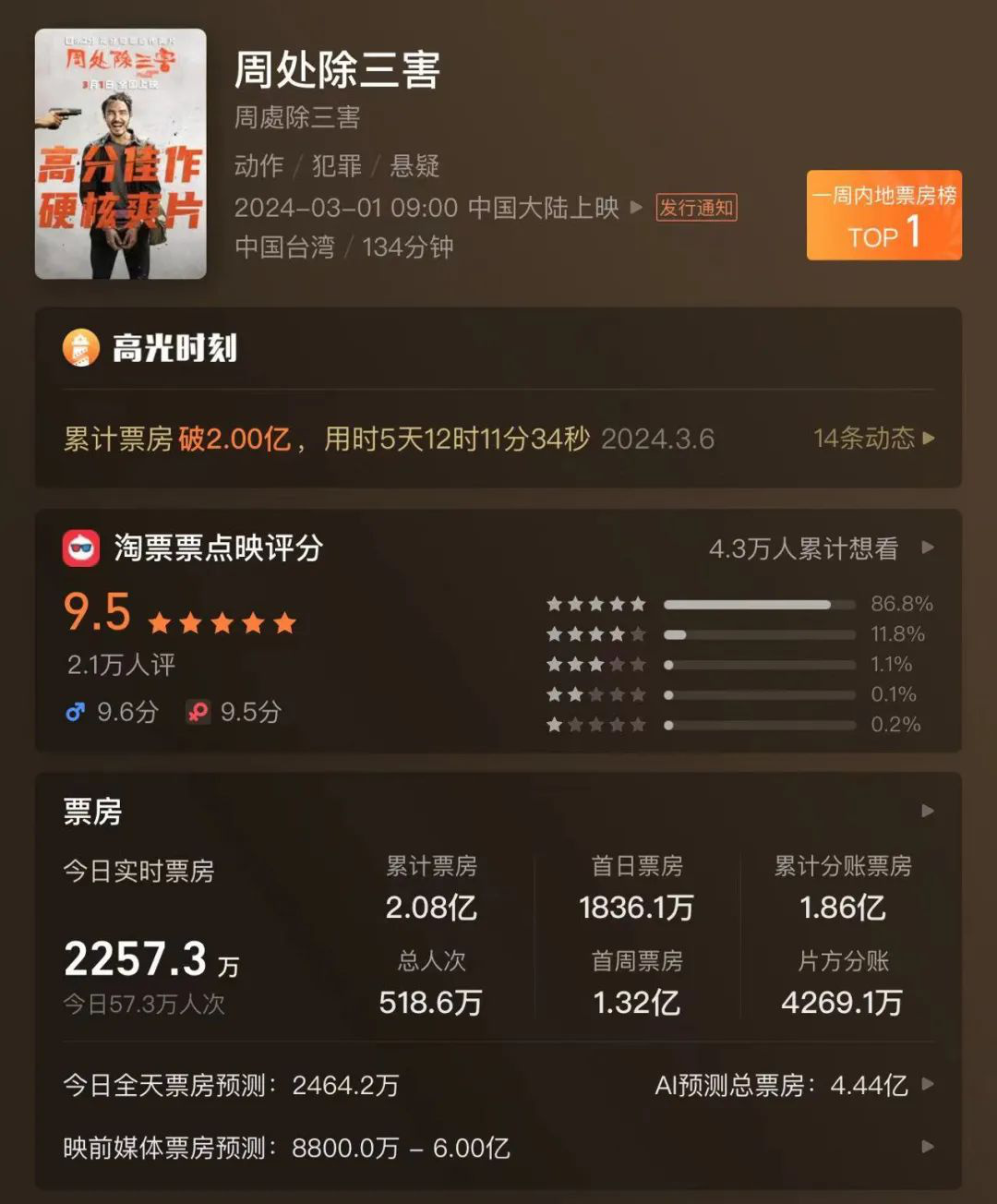
Not only that, "Eliminating Three Harms in Weeks" also succeeded in the popularity of online platforms, which triggered the spread of topics from multiple angles on social platforms. The turbulent public opinion about "Eliminating Three Harms in the Week" is very complicated, from the scale, performance, story, cult to the off-site plagiarism, which is very different from the spread of the Spring Festival movies with their own distinctive selling points.
However, starting from the film itself, the first impression of "Eliminating Three Harms in Weeks" to many audiences is relatively unified: a crime film that "fights violence with violence". At the same time, the background color of gangster movies from Hong Kong and Taiwan, coupled with the fable of "eliminating three evils around" and the metaphor of the cult massacre bridge, provides a rare cult temperament and bloody scene for mainland audiences. Generally speaking, it is a movie with cool films and curiosity as its core selling points.
The propaganda introduces that the allusion of "eliminating three evils in Zhou" quoted in the film can be found in The Book of Jin Zhou Chu Zhuan and Shi Shuo Xin Yu. According to records, the young man was burly and powerful, but he ran wild in the village and was hated by his neighbors. After Zhou Chu killed the tiger Nie Jiao alone, he himself turned back and reformed, so far all three evils have been eliminated.
The most wanted criminal Chen Guilin (Ehan Juan) is dying, only to find that he is only ranked third on the most wanted list. He is determined to find out the whereabouts of the first two most wanted criminals and get rid of them one by one. Chen Guilin thought that he had become a contemporary Zhou Chu in addition to the three evils, but he did not expect that greed and ignorance, which he could never understand, was the crime and punishment that life would eventually face.

The most wonderful thing about the story of the movie "Eliminating Three Harms Around" is that it provides too many allegorical plots, which brings great interpretable space. This is a rare movie-watching experience in domestic cinemas in recent years. This is not only a type crime movie that makes you "cool", but also provides enough metaphors for you to remember, so that you can find enough in the social memes spread by famous scenes and the interpretation of Douban long film reviews.
This versatility may be the internal main reason why "Eliminating Three Harms in Weeks" can exceed the box office expectation. In terms of scale or curiosity, in fact, quite a few Hong Kong and Taiwan cast films have made many attempts in the past two years, but the so-called scale often stays in the action and form and the ferocity of the crime film style itself, while "Eliminating Three Harms Around" conveys a certain sense of absurdity through metaphor and counter-routine, and then constitutes a contemporary fable that every audience can have a aftertaste, which is an important reason why the film temperament can "shock" many audiences.
The first interpretation space of the film story is obvious. (There are spoilers below) The three poisons "greed and ignorance" in Buddhism appear in the film with the intention of pigeon, snake and pig respectively, especially referring to Lin Luhe, Aberdeen and Chen Guilin, who rank the top three in the most wanted list in the film. The first two are easy to understand. Pigeons are regarded as representatives of greed because of excessive eating, while the venerable Lin Lu and others are advised to put everything down but they are searching for everything in the dark. Aberdeen was so jealous that he beat his men violently and threatened Chen Guilin when he visited the hair salon. His hatred was very direct.
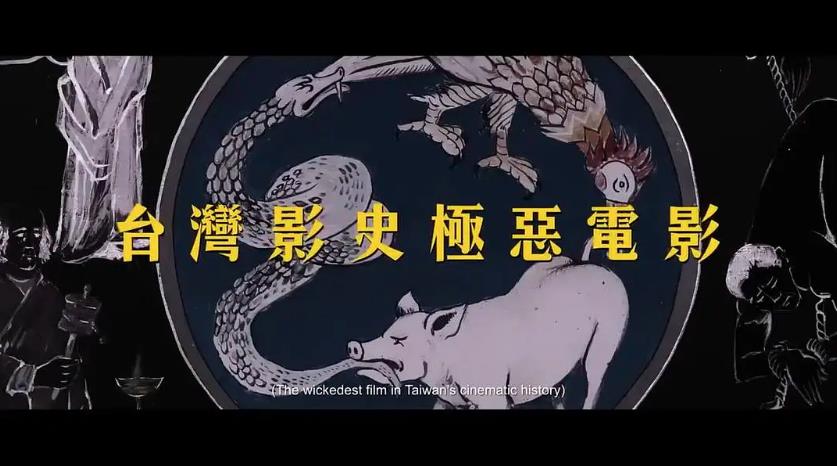
And "chi" is relatively obscure. In Buddhism, "chi" is also translated as "ignorance", which means ignorance and ignorance. To put it simply, I am confused. I don’t know what good and evil are, what greed is, what cause and effect are, and I don’t understand right and wrong, so I act upside down. Chen Guilin’s life track is just like this-when he was a young gangster, he shot the leader with his head fever to make a name for himself. With his youth and luck, he escaped the police attack. When he was in his thirties and forties, he was confused by the doctor and had to turn himself in after praying to God. However, he became famous by imitating the idea of "eliminating three evils around" because he was behind in the rankings. As a result, he was once again confused by the venerable man, thinking that he could make amends and become a new person.
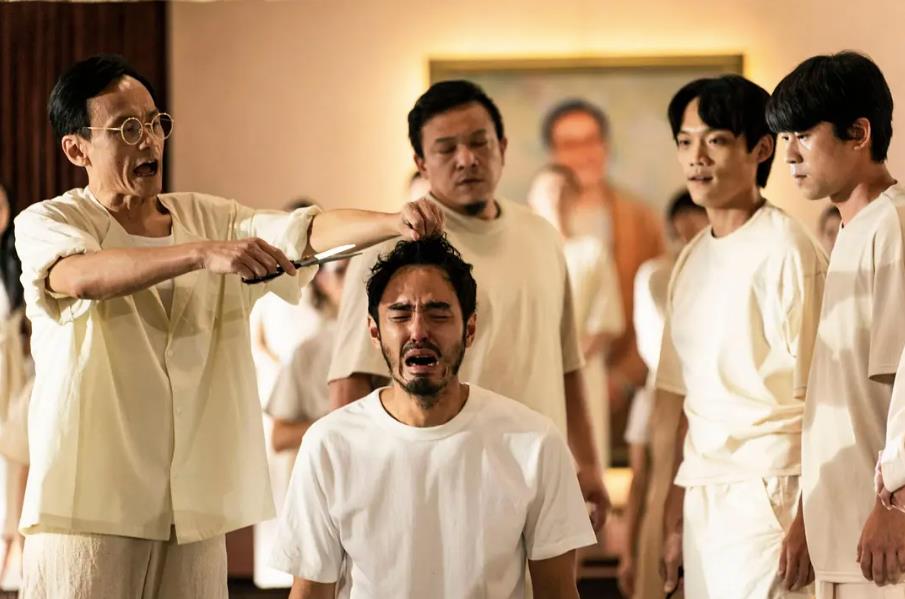
Chen Guilin is not a born villain, but more like a junior high school student who always stays in the stage of "chopping people with a knife without knowing the consequences", and is a person who "stays in his original idea". The process of "eliminating the three evils" is also the process of Chen Guilin’s "awakening" after "breaking his delusion". Therefore, the cult plot focusing on breaking the "delusion" will become the climax of the whole film, and Chen Guilin will just return after killing the venerable one and hearing the singing again.
On the other hand, just like Chen Guilin in the past, he casually became a criminal who harmed one side for his imaginary name. Chen Guilin once believed in his imaginary fame story so much, and believed in the theoretical disguise of the venerable when he thought his life was near. Perhaps he finally realized that the harm of "delusion" was hidden, but it was often the root of everything. Only people could begin to objectively ask about the nature of "belief" in themselves. It was not until the last moment of his life that perhaps Chen Guilin finally understood what he wanted to be "famous around".
Therefore, although this scene is not a profound depiction of cults, it is definitely a scene that can leave traces in China’s film history.
On the other hand, "Eliminating Three Harms in Zhou Chu" tells an ironic story of a marginal person who wants to enter the mainstream in vain. Obviously, Chen Guilin came from a defective and broken family, and was raised by his ancestors. All his capital was just himself, but he was born with the idea of making a name for himself. Therefore, he first became a wanted man by extreme means, and then he was lost in the collective atmosphere created by cults. But from beginning to end, he never really entered the mainstream of society.

In the past, many Taiwan Province film classics were famous for their multiple interpretations of "youth". In addition to those youth love movies, those movies with a sharper appearance are actually explaining the core of youth. In monga, also starring Ehan Juan, this kind of youth is hidden in the arrogance and extravagance under shouting and killing. In brighter summer day, a classic by Yang Dechang, youth may be Hani’s tall, fearless and fragile short life, and it is also the end of the inner world of Grade Four from purity to chaos.
So from another point of view, Chen Guilin, played by Ehan Juan, is also a "teenager" role in "Eliminating Three Harms in Weeks". Although he is not a teenager in the film, his "infatuation" from beginning to end is not only the ignorance and confusion mentioned above, but also the straightforward wildness unique to teenagers-he is fierce and dangerous with his minions exposed, but also vulnerable and defenseless inside. Ehan Juan is absolutely a match made in heaven for this role. You can’t think of anyone who can replace the "innocence" in his eyes.
In addition, there are quite a few film defects in "Eliminating Three Harms in Zhou Chu". The incompetence of the police role and the appearance of it, Chen Guilin was stabbed and buried alive in the coffin, but he just broke through the ground. Many plots were quite rough and unreasonable. However, the presentation of female characters and the complexity of the plot after the arrest have more or less hindered the upper limit of this film.
"Eliminating Three Harms in the Week" provides enough angles for social networks to talk about, and its communication logic is extremely prominent in favor of interpretation and discussion, rather than the common marketing communication mode in the past year. For example, on the popularity of the platform, "Eliminating Three Harms in Weeks" is actually not prominent on the vibrato platform where film and television are widely publicized. The cumulative number of topics played is nearly 1.2 billion, which is only similar to the recently popular online movie Anacondas’s "Arrogant 2", which is far from the data of the Spring Festival.

However, according to the data on platforms such as Weibo, Zhihu and Douban, the popularity of "Eliminating Three Harms in Weeks" basically far exceeds that of all other films:
Judging from the scores of Weibo searchers counted by Dengta Data, it has been the first since the second day of the release;
On the hot list of Zhihu, until March 6th, there were still two topics named "Eliminating Three Harms in Weeks" ranked third and fourth. There are tens of millions of questions about "How to evaluate" Three Harms in Weeks ",which even exceeds the discussion volume of all Spring Festival explosions in Zhihu, including YOLO’s Article 20 and Pegasus 2.
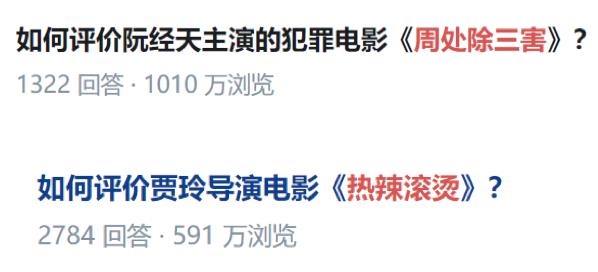
On Douban, more than 420,000 people have watched "Eliminating Three Harms at Weeks", which is basically equivalent to "Article 20" and "Pegasus 2", and the box office receipts of the last two films are more than ten times that of "Eliminating Three Harms at Weeks".
Therefore, the communication route of "Eliminating Three Harms in Zhou Chu" has largely returned to the discussion of the film content itself. Of course, many second-generation contents and more network memes about cult scenes have also played a role, but that is not the core driving force for the continuous destruction of "Eliminating Three Harms in Zhou Chu".
However, in the process of breaking the circle and spreading the topic of "Eliminating Three Harms around", there are indeed several enlarged nodes that have little to do with the movie plot itself, which are worth recording:
The first is the discussion of "scale". The change of the disk of "Eliminating Three Harms in Zhou Chu" has once again triggered the discussion about deletion. The topic is not new, but it has not been discussed for a long time.
The second is the "famous scene". The visual impact of Chen Guilin’s shooting of cultists is extremely strong, which leads to the crazy spread of relevant screenshots on the Internet, and promotes the spread of a large number of second-generation content of Chen Guilin, Venerable, Guitar and cult brainwashing theme songs;
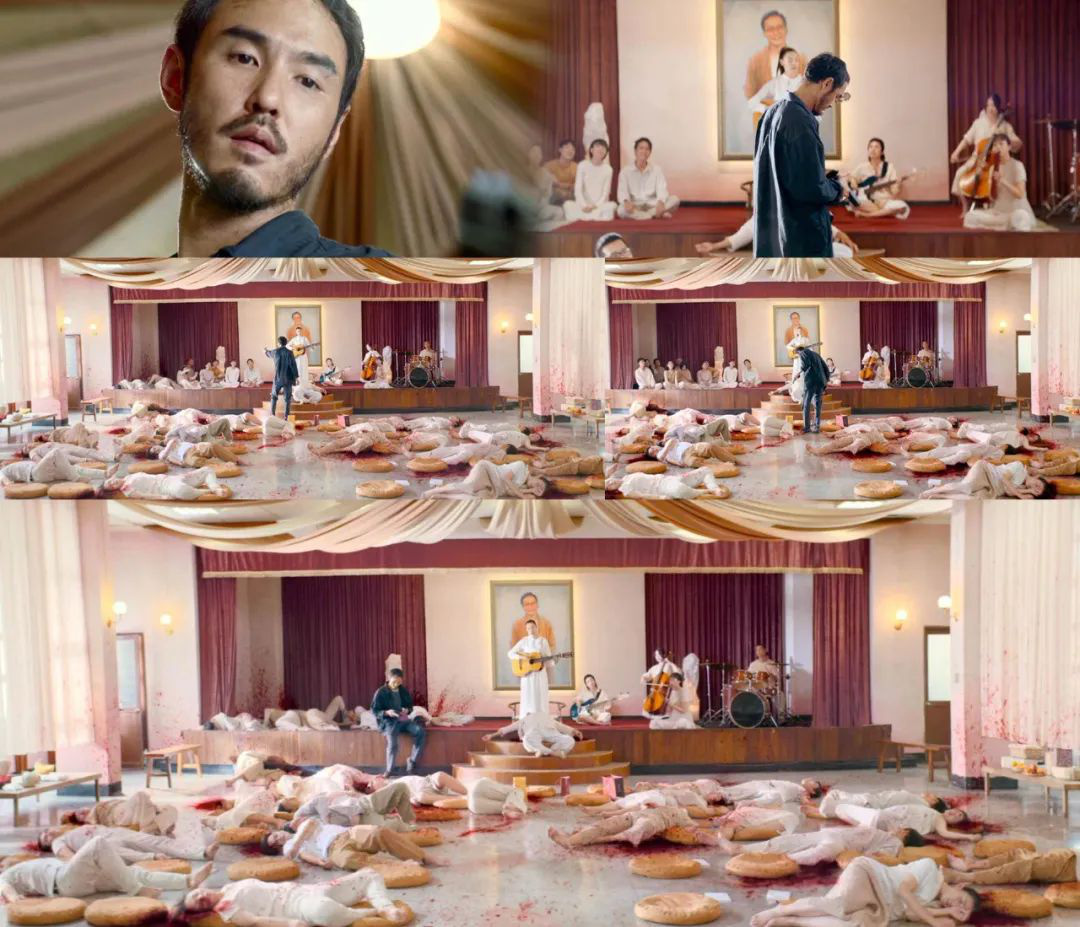
The third is "plagiarism". Joe Chien, director of Taiwan Province, issued a document pointing out that "Eliminating Three Harms in Weeks" plagiarized his own script "lawless", from the core idea of the story to the name and plot, of course, both sides are arguing for their own words. The rave reviews of the content and plagiarism have become more popular together, with nearly 100,000 praises from Weibo in Joe Chien.
Therefore, combining the content and communication situation, we may be able to better understand why this film can arouse a lot of discussions from different angles in today’s Jane-Chinese Internet, given that the publicity budget is flat. A real classic of film history may not be a hit, but most of the films that can make a hit today must have "points", at least let the public have enough space for discussion and interpretation, and enough motivation to participate in communication.
* Original article, please indicate the source when reprinting.